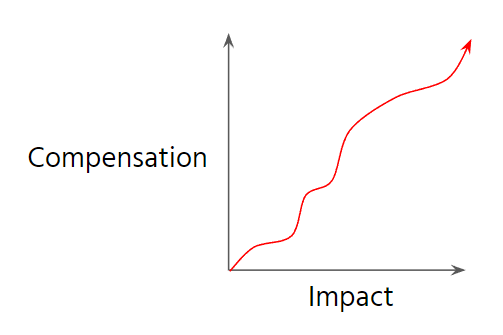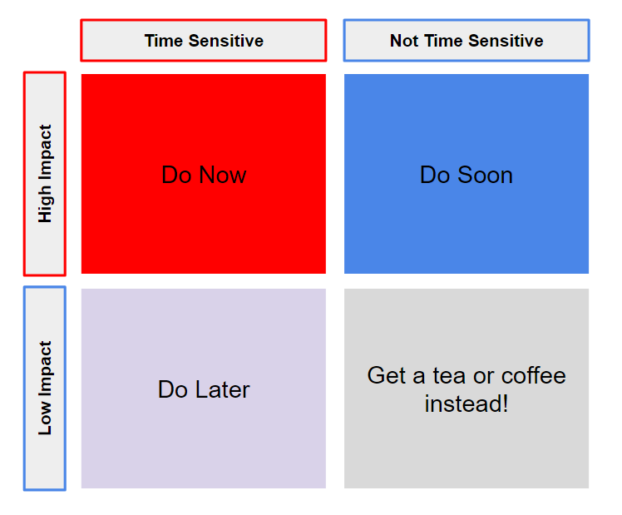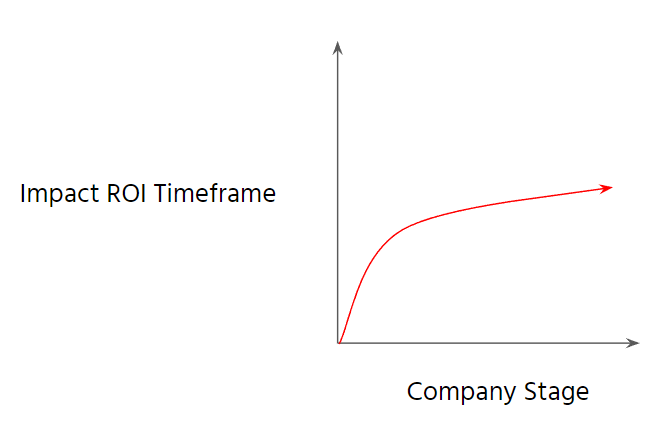TL;DR – Work smart not hard!
Impact sits at the core of your career development, and is the biggest factor in deciding your level of responsibility, scope and compensation. Impact is the ability to have a measurable effect and deliver value to a squad and/or your customers, either directly or indirectly. If you are in sales then your new revenue generated is effectively synonymous with your impact. If you’re a software engineer your impact may take many different forms, but a similar example is you build features, which can be sold, to generate revenue. Caution: impact is often confused with productivity and we broke down this difference in an earlier blog.
When it comes to compensation, there’s not necessarily a fixed 1:1 relationship with impact, as you will have to demonstrate sustained impact at a higher level in order to be rewarded for it financially. In the long term you will likely see something like this though:

Maximising your impact comes with an element of personal choice! At many companies – Echobox included – once you reach a minimum threshold of impact, then if you are happy and your manager is happy, there is no compulsion to increase further. It might be that you don’t want to increase your responsibility, scope and so on.
If you do choose to increase your impact, then you give something to your company, and the company will give a proportion back in compensation, and other potential benefits like more work flexibility, trust, perks etc.
The first thing you’re going to need is lots of information and context. Here is an incomplete list of ways to go about that:
- Build great relationships with your squad, other squads, with customers. Make sure to ask questions and understand where their challenges and pain points are.
- Understand your company, product and squad vision and/or roadmap.
- Over-communicate. Public slack threads, emails, video calls, bumping into people in the office. Try to avoid private communication channels and direct messages as this creates knowledge silos.
- Contribute to customer support tickets.
- Take part in customer calls or watch recordings.
- Listen or participate in the work conversations of your colleagues to make serendipitous discoveries.
- Take part in donuts.
- Participate in social events and discuss work just as much as non-work.
- Find out how your colleagues are feeling. What might be impacting their motivation?
- Find out what the leaders in your squad are struggling to find the time for.
- Take part in squad feedback retrospectives.
- What was learnt from previous work and the impacts it delivered?
- Read blogs to find out what challenges, and perhaps even solutions, other companies are having. Perhaps you’ve unconsciously accepted existing problems as unsolvable.
- What biases might we be able to identify in our decision making?
- Identify and validate any assumptions made above.
Collecting this context and information tells us why we might do something. It can lead us to feeling less productive at times, but that should be expected – remember, productivity is not impact. We rush this process at our peril as bad information will lead us to making bad decisions. You should now be able to categorise potential work or tasks based on their potential impact and time sensitivity. For example, if a task would have significant negative impact if not completed today, we would categorise this as high impact and time sensitive, and something you likely want to work on immediately.
If we break these categories down into four quadrants, it allows us to introspect our selection process. It’s an oversimplification from the nuances we face in the real world, but we should predominantly spend our time on high impact and time sensitive work, only then followed by high impact but not time sensitive work. We should avoid low impact and not time sensitive work altogether unless something in our information or context changes.

An often undervalued behaviour is to continue updating information and context while working on any problem. It may be we start working on something we thought was high impact only to find out it was low impact after breaking the problem down. At this point we should consider stopping the task to avoid spending more good time after bad.
Once we have determined why and what to work on we also need to determine how. We should aim to iterate solutions, delivering as much value as possible for the smallest amount of effort each iteration. This approach is known under many abbreviations – for example KISS, “Less is more”, “Simplicity is the ultimate sophistication” and so on. At Echobox we call it “90:10” – aiming to deliver 90% of the value for only 10% of the effort, or at least as close as we can. Iterating in this way allows us to more regularly assess potential impact against other options. Once you’ve completed work, don’t forget to feed back anything you’ve learnt into your information and context.
So far we’ve introduced good rules of thumb for maximising your impact, but there are additional complexities in the real world to be aware of. Particularly related to high impact and not time sensitive work, into which most of your possible choices may fall.
When we work on something the impact may not be delivered immediately, which for engineering and product work is the default. If we build a new feature with the intention of creating revenue, its impact isn’t delivered until the associated revenue is generated. That may take several months – or longer. An extreme zero-impact example to be avoided would be a small startup working on something that delivers impact only in 2 plus years. At the point the impact is delivered, the startup may already have gone out of business.
The more financially savvy readers might suggest using a Discounted Cash Flow analysis to compare such options. Unfortunately, once you consider the margin for error in your future cash flow, the estimate loses most, if not all, of its modelling value.
A deeper dive on this problem is reserved for a future blog, but you can reasonably expect the younger a company or product is the sooner the impact needs to be delivered. If you ask a leader within your organisation over the timeframe in which they typically expect work to deliver the majority of its impact, you’ll be off to a good start.

These long impact delivery timeframes also make feedback processes much more challenging. How can we reliably remember the choices made 12 or more months ago that may or may not have delivered their impact today? How do we quantify the impact delivered, particularly if it was a marginal gain many years ago? During your career, you may only get a small number of opportunities to iterate on these particularly long-term decisions. These are questions reserved for future blog posts, but they are still worth being aware of.
So far we’ve been considering impact primarily from a personal perspective. Consider that your impact influences and is influenced by those around you, in a recursive relationship. This is particularly important for leaders who intentionally trade-off some personal impact in return for their squad and company delivering more in total.
Some further ways in which maximising your impact is unavoidably complicated:
- Recognising how risks, cost and potential impacts change over time. For example, do any factors compound over time?
- Considering low probability but high cost events? For example a major security breach. How do we prioritise this kind of work?
- How to correctly value marginal gains over long periods? A historical example was the undervaluing of devops on long-term organisation impact. What other equally important factors are yet to be discovered or optimised?
- Understanding the motivation and emotional states of your colleagues and things you can do to help.
Long term there can be no substitute for experience and experimentation on your journey to maximise impact, particularly when it comes to managing these more complex considerations. This blog has hopefully allowed you to identify some quick wins in your own processes, and from there ask better questions to others in your organisation. You’ll progress quickly and undoubtedly improve your impact if you’re always humble, get feedback and consider the above.

